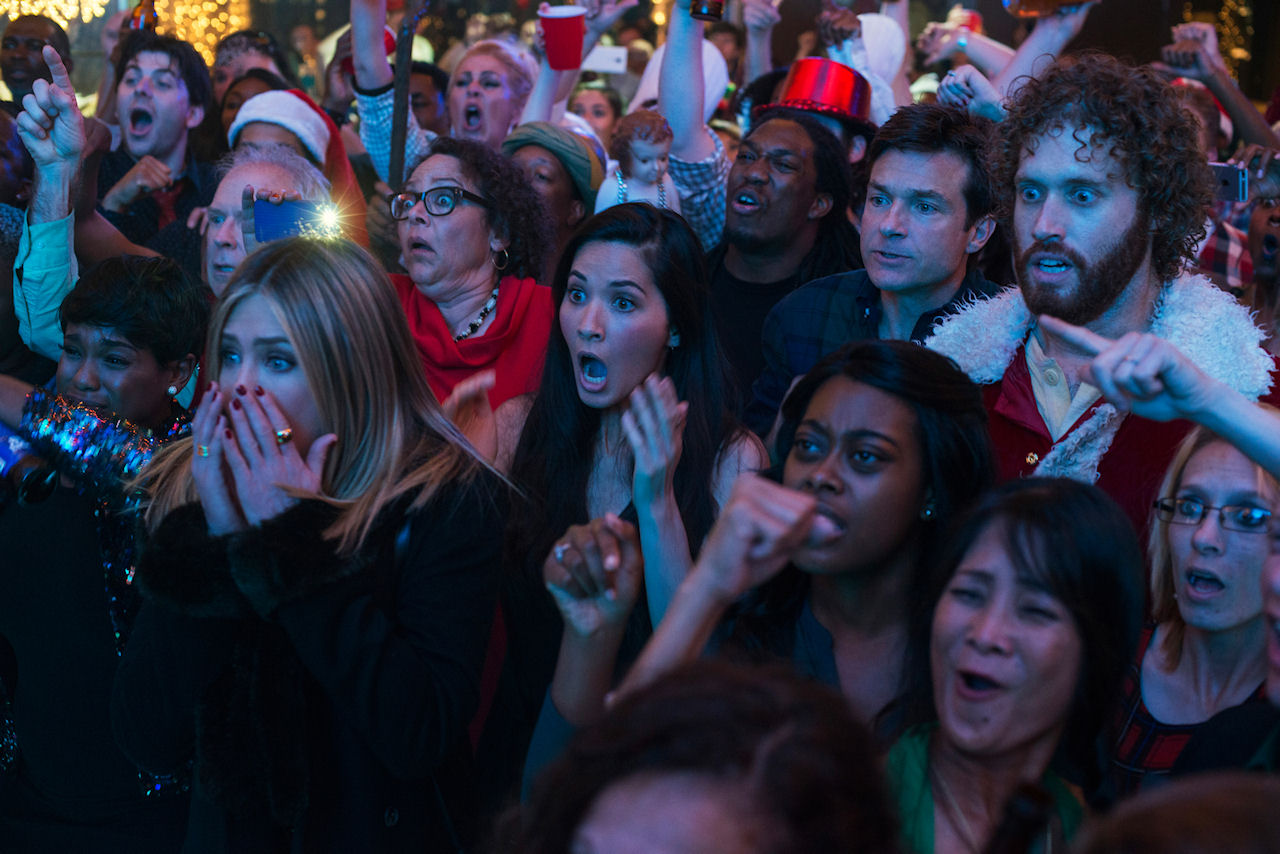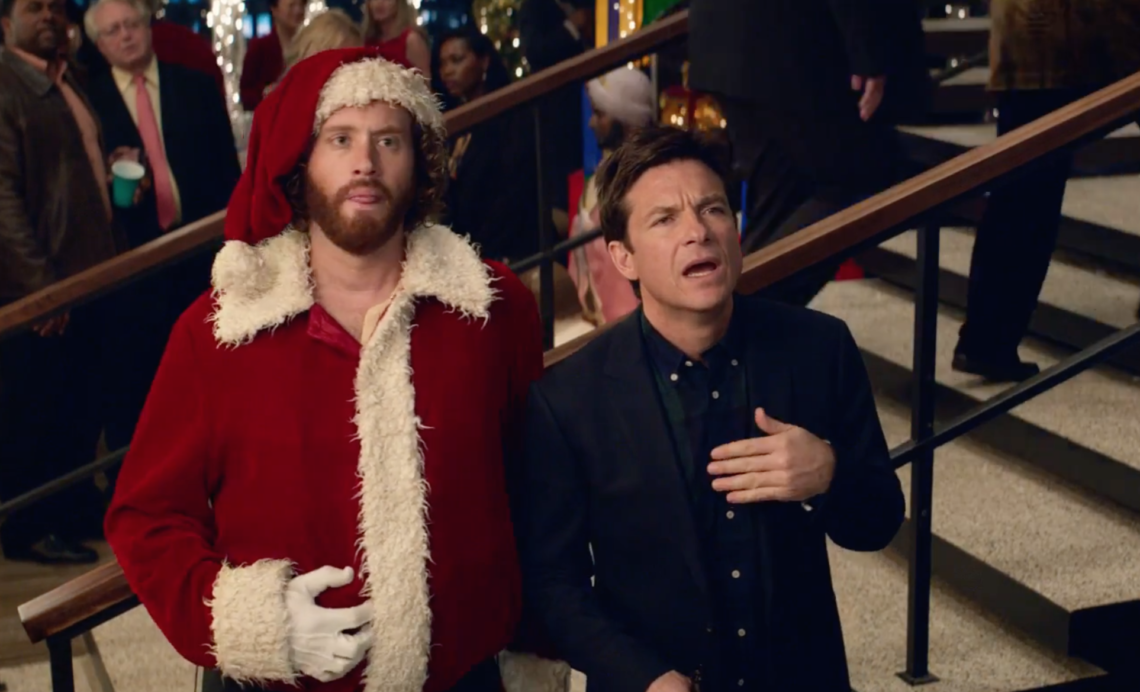As far as by-the-numbers, big-budget major studio comedies go, Office Christmas Party is perfectly adequate. It checks off all the major points on the Gross-Out Comedy list, e.g. drinking eggnog out of an “eggnog luge” shaped like a dick; the Destructive Party Film list—cars, buildings, and bodies are destroyed in the downtown Chicago area; and of course, the Personal Growth list, i.e. almost everyone has an “arc” and their personal weaknesses or issues are resolved by the end of the film, conveniently amidst all the debauchery. It’s not as laugh-out-loud funny as it wants to be, but there are plenty of chuckle-worthy moments, especially in the line deliveries and tossed-off asides, the saving grace of all studio comedies nowadays. Everyone in the large ensemble has an infectious energy because they’re clearly having a blast, with the possible exception of Jason Bateman, who’s now going through the motions of his tired, but nevertheless effective straight-man routine. The requisite sweetness lands better than anticipated, but the holiday itself does most of the heavy lifting on that front. It’s honestly not a bad way to spend 100 minutes at the movies. While that’s certainly faint praise, especially given the numerous better alternatives this Prestige Film Season, it’s hard not to stick up for a movie whose only modest goal is to entertain with montages of people getting fucked up and demolishing shit. Office Christmas Party doesn’t quite reach that goal, but it tries, dammit, and sometimes watching a large cast and crew try can be enough.
Since the plot is effectively irrelevant—T.J. Miller, Bateman, and Olivia Munn throw an epic office Christmas party (hey, that’s the title!) to try to woo potential client Courtney B. Vance so CEO Jennifer Aniston won’t shut them down—and the merits of the film, or their lack thereof, are more or less self-evident, it’s more productive to focus on other more interesting aspects of the film. Here are some of them in no particular order:

- It’s both fascinating and vexing how much Office Christmas Party goes out of its way to demonstrate its woke bona fides. Though there’s the obligatory political correctness joke, which takes the form of Kate McKinnon’s HR director character wearing a multi-faith Christmas sweater, there are more than a couple scenes that pay lip service to the privilege on display. Mainly, T.J. Miller in a Santa costume praying to God to thank him for making him rich, white, male, and straight (well, except that one time…), but also, there’s a scene when Jillian Bell, who plays a pimp, yells at her bulky male assistant as he holds a car door open for her, “I can close the door myself! I’m a woman in 2016!”
- All mediocrity aside, directors Will Speck and Josh Gordon’s decision to set the film in downtown Chicago is their most inspired creative choice, if only because it provides the film with a veneer of specificity. By their own admission, it was important for them not to set the film on the coasts because the setting “had to reflect the characters” who “pulled themselves up from the bootstraps and were determined to make something out of nothing.” Even though the Clark Street Bridge plays a crucial role in the first of two utterly ridiculous climaxes, they could have certainly done more with the location. But I will concede that Gordon’s claim that “During the wintertime in cold cities, you sometimes need a party to break through the melancholy” is 100% accurate.
- On that note, there’s a short scene when Olivia Munn and Jason Bateman try and fail to light a joint with matches on a freezing Chicago rooftop. They are later about to make out, but are interrupted by Rob Corddry drunkenly pissing in the snow. Intentionally or not, these are the two most regionally precise and relatable moments in the film.
- Despite the aforementioned Personal Growth nonsense that tanks the last third, it’s admirable that Office Christmas Party tries to inject personality into each member of its ensemble. Vanessa Bayer and Karan Soni come off the best as a burdened single mother who just wants to meet a nice guy and a nerdy tech geek who tries to pass off an escort as his model girlfriend, respectively. (That may sound reductive on paper, but both do their level best to ground their characters in some semblance of reality.) Vance’s tightly-wound-businessman-turned-coked-out-party-monster and McKinnon’s nerdy-but-hiding-a-fun-side characters will likely be the critical and audience favorites of the supporting cast, but special commendation should go to Corddry and Sam Richardson, who do great work that will go entirely unnoticed.
- Gordon claims that Aniston’s no-bullshit, ball-busting CEO character was created for her because “she’s absolutely fearless when it comes to playing somewhat unlikeable characters in comedies,” but neither she nor the film can bridge the disparity between unlikable and “gleefully putting 80 employees out of work during the holidays” cruel. It’s one thing to mess with a strange child who stole your Cinnabon; it’s another thing to take pride in putting strangers on unemployment.
- There’s a subplot about a special algorithm that improves Internet connectivity that quite literally makes no sense, so of course it’s the lynchpin for the film’s second ridiculous climax.
- Honestly, the singular problem with this film is that the plot distracts from the debauchery and the montages of debauchery are too boring. It’s unreasonable to expect the film entirely feature compelling scenes of officemates getting messed up on an obscene amount of alcohol and drugs, but then why call your film Office Christmas Party?
- The reported budget was $45 million; presumably, a sizable amount went towards the visual effects in the back half of the film, especially the major action sequence. But that still leaves so many questions about where exactly the rest of the money went. Maybe we’ll find out in the sequel.

















